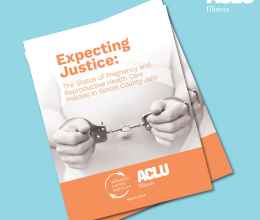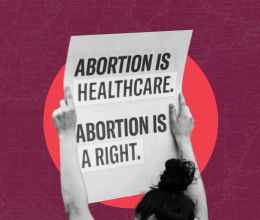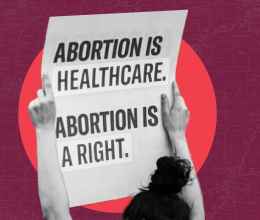By Katie Watson, Senior Staff Counsel, Women's and Reproductive Rights Project
Happy Birthday Roe! The decision that established the constitutional right to abortion is middle-aged and so am I, which means I’m one of the millions of American women who grew up with this freedom.
Abortion is common (1 in 4 American women will have an abortion at some point, and 42% of all unintended pregnancies end in abortion), so it seems like we should be able to take this right for granted. But we can’t. We must fight every day to preserve this basic right, and here’s why.
We fight because abortion is central to women’s freedom. With access to contraception and abortion, women can plan when and if they want to become mothers, which empowers them to pursue whatever life they want. This freedom and empowerment are why many people will celebrate Roe today, and why others are dedicated to dismantling the decision.
Empowered women are inconvenient. Empowered women won’t tolerate sexual harassment and abuse. They seek higher education with confidence, they compete for what used to be considered men’s jobs, and they end up being men’s bosses. Empowered women can earn a paycheck and enjoy sex outside of marriage if they choose to, and that has raised the bar for men in the post-Roe era. Empowered women expect true partnership, and when you don’t come through for them, they break up with you. Those who oppose equal opportunity for women in the public and private spheres have to oppose abortion’s legality, because they’re directly linked.
But it’s not fair to say every abortion opponent wants women to go back to the 1950s. There are those I think of as “honest abolitionists,” who are solely focused on their own religious or personal views about the moral status of embryos and fetuses, views which are different than those of millions of women and couples having abortions and their health care providers.
It’s this disagreement that led the Roe Court to determine that before viability, the moral status of embryos and fetuses is a matter for individual conscience, not legislation: “We need not resolve the difficult question of when life begins. When those trained in the respective disciplines of medicine, philosophy, and theology are unable to arrive at any consensus, the judiciary, at this point in the development of man's knowledge, is not in a position to speculate as to the answer.”
Women and couples facing unintended pregnancies are all moral agents who think about the ethics of abortion. While some conclude it is not morally permissible, for others it is the moral, ethical and best decision for them.
We need not reach a national consensus on the moral status of embryos and fetuses. What we need consensus on is our shared value of pluralism. Americans may always disagree on abortion, just as they disagree on religion, politics, and so many other things. At the ACLU what we agree on is women’s freedom, respect for neighbors who see the world differently than we do, and a constitution that prevents the government from altering the course of your life based on someone else’s vision of morality.
All these reasons and more are why today I celebrate Roe, and every other day of the year I fight to defend her.
***
Katie Watson is Senior Counsel at the Women’s and Reproductive Rights Project of the ACLU-IL, a bioethics professor at Northwestern’s Feinberg School of Medicine, and the author of Scarlet A: The Ethics, Law and Politics of Ordinary Abortion.





